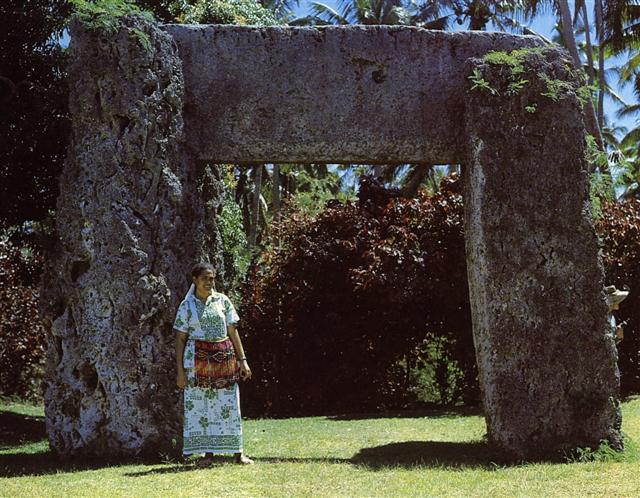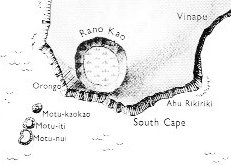Bb5.1 Clearly we cannot make good sense of the rongorongo texts without taking account of numbers, stars, myths, and our treasure of common words. For instance did my recent discussion regarding Carmenta make me realize why in the Swedish language (tongue) the frame of a door is dörr-karm. ... When Gwion writes in the Câd Goddeu, 'Stout Guardian of the door, His name in every tongue', he is saying that doors are customarily made of oak as the strongest and toughest wood and that 'Duir', the Beth-Luis-Nion name for 'Oak', means 'door' in many European languages including Old Goidelic dorus, Latin foris, Greek thura, and German tür, all derived from the Sanskrit Dwr, and that Daleth, the Hebrew letter D, means 'Door' - the 'l' being originally an 'r' ...
The peculiar words vere and verega of Metoro might have correspond to the one 'who looks both back and forward': ... Janus was perhaps not originally double-headed: he may have borrowed this peculiarity from the Goddess herself who at the Carmentalia, the Carmenta Festival in early January, was addressed by her celebrants as 'Postvorta' and 'Antevorta' - 'she who looks both back and forward' ... Ga. Preposed plural marker of rare usage. 1. Sometimes used with a few nouns denoting human beings, more often omitted. Te ga vî'e, te ga poki, the women and the children. Ga rauhiva twins. 2. Used with some proper names. Ga Vaka, Alpha and Beta Centauri (lit. Canoes). Vanaga. It would seem reasonable to conclude that Postvorta corresponded to p.m. - after (post) noon - and Antevorta to before (ante) noon (a.m.). Looking back in the afternoon you will clearly see a.m. ... For the Maori the past is an important and pervasive dimension of the present and future. Often referred to as the 'ever-present now', Maori social reality is perceived as though looking back in time from the past to the present. The Maori word for 'the front of' is mua and this is used as a term to describe the past, that is, Nga wa o mua or the time in front of us. Likewise, the word for the back is muri which is a term that is used for the future. Thus the past is in front of us, it is known; the future is behind us, unknown. The point of this is that our ancestors always had their backs to the future with their eyes firmly on the past. Our past is not conceived as something long ago and done with, known only as an historical fact with no contemporary relevance or meaning. In the words of a respected Maori elder: The present is a combination of the ancestors and 'their living faces' or genetic inheritors, that is the present generations. Our past is as much the face of our present and future. They live in us ... we live in them ... Ga Kope Tutuu Vai A Te Taaga meant the 3 islets outside the southwestern corner of Easter Island, before the dreamsoul (kuhane) arrived to the main land.
A vortex is where things mill around in the water while going down in contrast to the very top at the vertex.
... Dante kept to the tradition of the whirlpool as a significant end for great figures, even if here it comes ordained by Providence. Ulysses has sailed in his 'mad venture' beyond the limits of the world, and once he has crossed the ocean he sees a mountain looming far away, 'hazy with the distance, and so high I had never seen any.' It is the Mount of Purgatory, forbidden to mortals. 'We rejoiced, and soon it turned to tears, for from the new land a whirl was born, which smote our ship from the side. Three times it caused it to revolve with all the waters, on the forth to lift is stern on high, and the prow to go down, as Someone willed, until the sea had closed over us.' The 'many thoughted' Ulysses is on his way to immortality, even if it has to be Hell. The engulfing whirlpool belongs to the stock-in-trade of ancient fable. It appears in the Odyssey as Charybdis in the straits of Messina - and again, in other cultures, in the Indian Ocean and in the Pacific. It is found there too, curiously enough, with the overhanging fig tree to whose boughs the hero can cling as the ship goes down, whether it be Satyavrata in India, or Kae in Tonga ... In Manuscript E we have an example of the opposite phenomenon, viz. moving around in the air while going up: ... Night came, midnight came, and Tuu Maheke said to his brother, the last-born: 'You go and sleep. It is up to me to watch over the father.' (He said) the same to the second, the third, and the last. When all had left, when all the brothers were asleep, Tuu Maheke came and cut off the head of Hotu A Matua. Then he covered everything with soil. He hid (the head), took it, and went up. When he was inland, he put (the head) down at Te Avaava Maea. Another day dawned, and the men saw a dense swarm of flies pour forth and spread out like a whirlwind (ure tiatia moana) until it disappeared into the sky. Tuu Maheke understood. He went up and took the head, which was already stinking in the hole in which it had been hidden. He took it and washed it with fresh water. When it was clean, he took it and hid it anew. Another day came, and again Tuu Maheke came and saw that it was completely dried out (pakapaka). He took it, went away, and washed it with fresh water until (the head) was completely clean. Then he took it and painted it yellow (he pua hai pua renga) and wound a strip of barkcloth (nua) around it. He took it and hid it in the hole of a stone that was exactly the size of the head. He put it there, closed up the stone (from the outside), and left it there. There it stayed ... However this difference in perspective should not bother us too much because people living south of the equator could follow the path of the Full Moon among the stars instead of deliberating where the Sun currently was in the Gregorian calendar. ... You are the one who shall stay here. We, on the other hand, have to turn around. Makoi replied, All right with me! Then Ira continued to speak to Makoi: Tomorrow, when it grows light, set out and name the places beginning with Apina. Makoi replied, How shall I give the names? Again Ira spoke, In Hiva are the names that are to be taken to name (the places of the new land). It grew light and Makoi got up. He set out and came to Apina. When he arrived there, he gave the name This is Apina Iti, this is Rapa Kura. He went on and came to Hanga O Ua. He gave the name This is Hanga O Ua of the Beautiful Wave (vave renga). Makoi went on, giving names, until he had made a (complete) circle around both sides (of the island). In Apina Nui a stone (maea) was erected, saying that the naming was done on a (round) trip during a single day ... Presumably this single day corresponded to day 365. ... Another name for Mercury was Hermes and Hermes Trismegisthos (thrice-mighty) could have referred to the fact that there were 3.141 * 115.88 = 364.0 days for the cycle of the Earth around the Sun. Although the calendar has 365 days for a year this is due to the fact that the Earth has to turn around an extra day in order to compensate for how the direction to the Sun changes during a year ...
The beginning of line Bb5 should therefore correspond to the beginning of the season when Venus was visible as Morning Star → on her way up like the Sun.
...Then the big Fish did swallow him, and he had done acts worthy of blame. Had it not been that he (repented and) glorified Allah, He would certainly have remained inside the Fish till the Day of Resurrection. - Qur'an, chapter 37 (As-Saaffat), verse 139–144. But We cast him forth on the naked shore in a state of sickness, And We caused to grow, over him, a spreading plant of the gourd kind. And We sent him (on a mission) to a hundred thousand (men) or more. And they believed; so We permitted them to enjoy (their life) for a while. - Qur'an, chapter 37 (As-Saaffat), verse 145–148 ...
|
|||||||||||||||||||||||||||||||||||||||||||||||||||||||||||||||||||||||||||||||||||||||||||||||||||||||||||||||||||||||||||||||||||||||||||||||||||||||||||||||||||||||||||||||||||||||||||||||||||



















